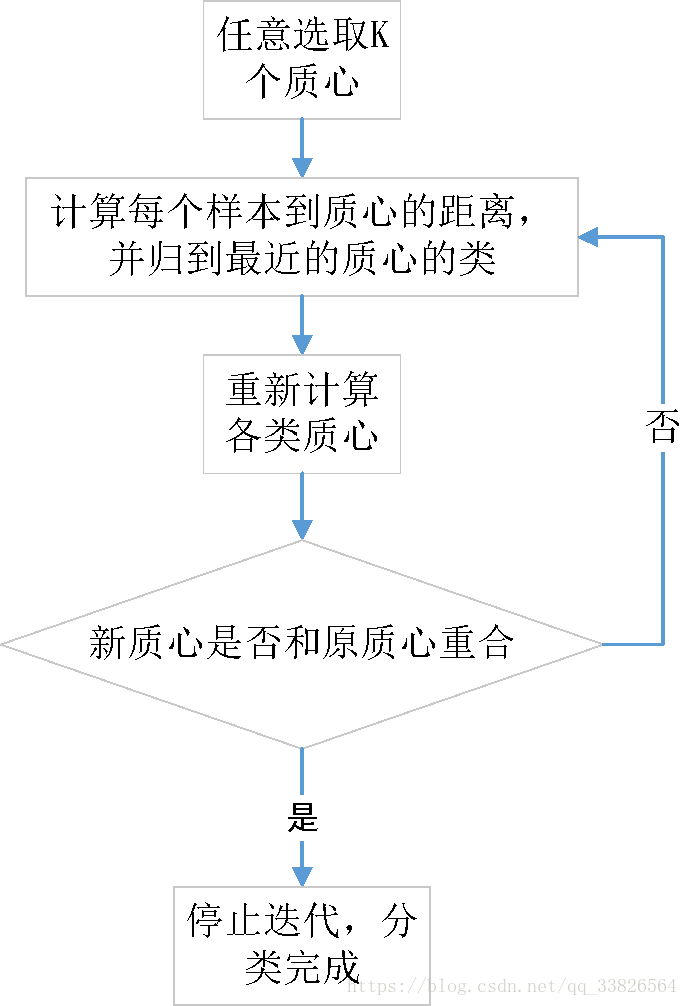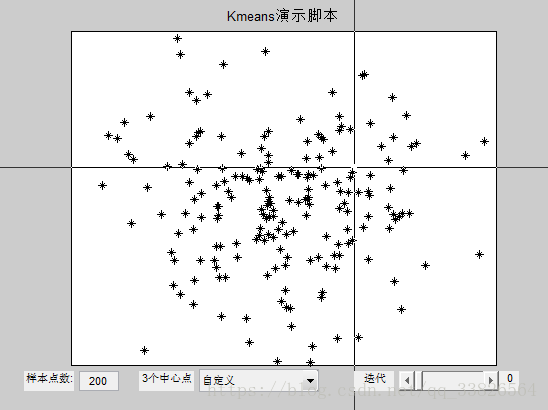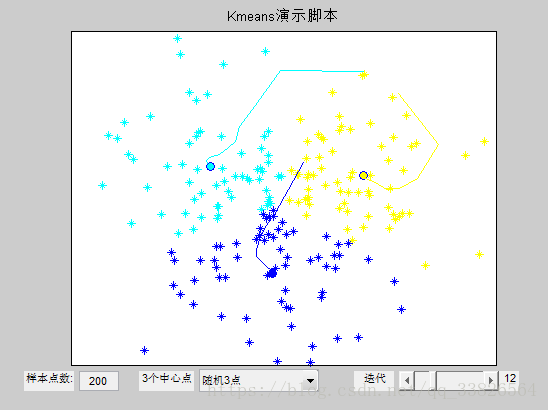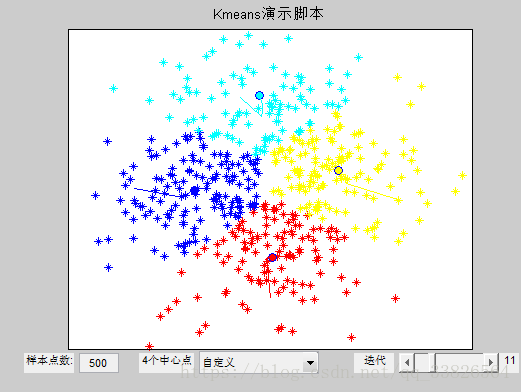K-means聚类分析-交互式GUI演示(Matlab)
K-means聚类分析-交互式GUI演示(Matlab)
学习K-means的时候总是想,这应该是一个很酷的算法,那么酷的算法,就应该有比较酷的demo来演示它,于是我写了这个程序就是为了能装逼,哦不,可以更直观的和K-means算法进行互动。原创程序,希望大家可以喜欢,多多指教。
目录
- K-means聚类分析-交互式GUI演示(Matlab)
- 目录
- 原理简介
- 实现效果和功能展示
- 一点体会
- 代码
- KmeansMain.m
- colorMap.m
原理简介
- K-means是无监督学习的聚类算法,是机器学习中最重要的算法之一,他的目的是通过机器学习自动探索一批未知的数据,并将其分类。
- 具体的算法流程如下:

|
实现效果和功能展示
- 参考图2,使用 Matlab 编写 GUI 界面程序,完成对 K-means 算法基本原理的演示,程序界面如图 2所示。点击“样本点数”的
edit框,可以修改初始样本点个数,“中心点”下拉框可以选择投放中心点的方式(如图3所示,若选择“自定义”,则可以使用光标在axes上自定义选择任意位置任意个数中心点如,若选择“随机2点”,则随机产生2个中心点,“随机3点”,“随机4点”同理。),“迭代”进度条,可以拉动以实现迭代,右边的文本框可以实时显示迭代的次数,迭代过程中中心点的运动轨迹将被绘出(如图5所示为随机3个中心点进行迭代分类,不同类用不同的颜色区分)。需要注意的是,该程序可以循环演示,无需退出,重新选择中心点后将会重新初始化整个过程。

|
 图2 程序界面 图2 程序界面
|
 图4 自定义落点 图4 自定义落点
|
 图5 随机3个中心点进行迭代 图5 随机3个中心点进行迭代
|
 图6 自定义7个中心点进行分类 图6 自定义7个中心点进行分类
|
 图7 自定义4点,500个样本 图7 自定义4点,500个样本
|
|
一点体会
内嵌式 Matlab 编程的时候,主函数里面的变量都会被视为
global,为所有子函数可见。在声明回调函数的时候,’callback’,{ @classify,gca},的意思是声明该控件的回调函数为classify,同时传入参数gca,需要注意的是,在定义classify函数的时候,默认是有两个控件参数hObj(当前控件句柄),和event(当前控件事件结构体)的,传入的参数必须放在这两个参数后面,才能实现正常的参数传递,如function classify(hObj,event,ax),传入的参数gca会赋值给临时变量ax。产生多维正态随机变量的时候使用
mvnrnd(Multivariate normal random numbers),语法为R = mvnrnd(MU,SIGMA),其中SIGMA为协方差矩阵而不是方差,应该注意的是多维随机变量(随机向量)要表示其内部随机变量的关系,使用的是协方差,而不是方差,当然,内部随机变量的方差位于这个协方差矩阵的对角。- 若要在
axes中绘点,需要加上点标志,如‘*’或者’.’,才会在plot中绘点,不然其默认为绘制线。
代码
KmeansMain.m
function KmeansMain
close all;clear;clc;
%随机生成随机数
mu = [0 0];
%协方差矩阵,对角为方差值0.3,0.35
var = [0.3 0; 0 0.35];
samNum = 200;
data = mvnrnd(mu, var, samNum);
a = figure;
plot(gca, data(:,1), data(:,2), '*', 'color', 'k');hold on;
classNum = [];%类数
iterNum = 0;%迭代次数
x = [];
centerPoint = [];
centerPointPathAarry = [];
h_plotCenterPoint = [];%中心点绘制handle
h_plotPath = [];%中心点路径绘制handle
%centerPointPathAarry结构
%第1次迭代|中心点1(x,y)|中心点2(x,y)|中心点3(x,y)|中心点n(x,y)
%第2次迭代|中心点1(x,y)|中心点2(x,y)|中心点3(x,y)|中心点n(x,y)
h_slider = uicontrol(a,'Style', 'slider',...
'SliderStep',[0.02 0.02],...
'Min',0,'Max',50,'Value',0,...
'Position', [400 20 100 20],...
'Callback', {@classify,gca});
h_edit = uicontrol(a,'Style', 'edit',...
'String', '200',...
'Position', [80 20 40 20],...
'Callback', {@paintRandomPoint,gca});
uicontrol('Style', 'popup',...
'String', '自定义|随机2点|随机3点|随机4点',...
'Position', [200 22 120 20],...
'Callback', {@SpsfPoit,gca});
h_t1 = uicontrol('Style','text','String','迭代', ...
'Position', [355 20 40 20]);
h_textClassNum = uicontrol('Style','text','String','中心点', ...
'Position', [140 20 55 20]);
uicontrol('Style','text','String','样本点数:', ...
'Position', [25 20 50 20]);
h_textshow = uicontrol('Style','text','String','0','Position', [500 20 20 20]);
set(gca,'xtick',[],'ytick',[],...
'title',text('string','Kmeans演示脚本','color','k'));
xlim([-1.5 1.5]);ylim([-1.5 1.5]);
%%%%%%%%%%%%%%%%%%%%
function SpsfPoit(hObj,event,ax)
set(h_slider,'value',0); %清零滑动条,以实现从0迭代
cla;%清空axes
set(h_textshow,'string',0);%界面显示的迭代次数清零
%句柄赋值为空
h_plotCenterPoint = [];
h_plotPath = [];
centerPointPathAarry = [];%轨迹归零
plot(gca, data(:,1), data(:,2), '*', 'color', 'k');%样本点颜色初始化
val = get(hObj, 'Value');%获得popup menu的值
if val == 1
%选择任意若干点作为中心点
[x, y] = ginput;
centerPoint = [x y];
[classNum, ~] = size(centerPoint);
repaintBeginPoint(h_plotCenterPoint, classNum, centerPoint);
elseif val == 2
%选择任意2点作为中心点
centerPoint = rand(2, 2)*2-0.5;
[classNum, ~] = size(centerPoint);
repaintBeginPoint(h_plotCenterPoint, classNum, centerPoint);
elseif val == 3
%选择任意3点作为中心点
centerPoint = rand(3, 2)*2-0.5;
[classNum, ~] = size(centerPoint);
repaintBeginPoint(h_plotCenterPoint, classNum, centerPoint);
elseif val == 4
%选择任意4点作为中心点
centerPoint = rand(4,2)*2-0.5;
[classNum,~] = size(centerPoint);
repaintBeginPoint(h_plotCenterPoint, classNum, centerPoint);
end
[labelSample] = classifyAndShowAndLabel(classNum, centerPoint, data, samNum, gca);
centerPointPathAarry = [centerPointPathAarry; reshape(centerPoint', 1, classNum*2)];
set(h_textClassNum, 'string', [num2str(classNum) '个中心点']);
end
%%%%%%%%%%%%%%%%%%%%%%%%%%%%%%%%%%%%%%%
%%%%%%%%%%%%迭代分类函数%%%%%%%%%%%%%%%%%%%%
function classify(hObj,event,ax)
iterNum = round(get(hObj, 'value'));
set(h_textshow, 'string', iterNum);
%根据起始点分类,并且为不同的类标记不同颜色,返回带标签样本数据
[labelSample] = classifyAndShowAndLabel(classNum, centerPoint, data, samNum, gca);
%重新获得起始点矩阵centerPoint(x|y)
[centerPoint] = recalClassCenter(labelSample, classNum);
centerPointPathAarry = [centerPointPathAarry; reshape(centerPoint', 1, classNum*2)];
%重新绘制起始点centerPoint(x|y)到axes上
repaintBeginPoint(h_plotCenterPoint, classNum, centerPoint);
disp('path:');
disp(centerPointPathAarry);%将中心点的轨迹显示出来
for i = 1:classNum
[selected_color] = colorMap(i, classNum);
h_plotPath(i)=plot(centerPointPathAarry(:, (i*2)-1), centerPointPathAarry(:,i*2), 'color', selected_color);
end
end
%%%%%%%%%%%%%%%函数部分%%%%%%%%%%%%%%%%%%%%%%%%%%%%
%%%%%%%%%%%%%%%%%%%%%%%%%%%%%%%%%%%%%%%%%%%%%%%%%
%%%%%%%%%%%%%%%重新绘制起始点函数%%%%%%%%%
function repaintBeginPoint(handle_plo,classnum,R)
delete(h_plotCenterPoint);%清除绘制的中心点,并将句柄赋值为空
h_plotCenterPoint=[];
%重新绘制起始点,每个起始点的颜色不同
for i = 1:classnum
[selected_color] = colorMap(i, classnum);
h_plotCenterPoint(i) = plot(R(i,1), R(i,2), 'o', 'MarkerSize', 7, 'MarkerFaceColor', selected_color);
end
end
%%%%%%%%%%%%%%%%%%%%%%%%%%%%%%%%%%%%%%%%%%%%%%%%%%
%%%%%%%%%%%%%%%%%%%%重新计算类重心%%%%%%%%%%%%%%%%%%%%%%
function [newCenterPoint]=recalClassCenter(labelSample,classNum)
%R为重新被计算的类中心
newCenterPoint=[];
%分类并且计算每个类的重心
for i=1:classNum
%取出所有标签为i类的所有行,即第i类的所有点
classs=labelSample(labelSample(:,3)==i,:);
%有用的只有第一列和第二列,去除标签列
classs=[classs(:,1),classs(:,2)];
%重新计算重心
classs_repoint=mean(classs);
newCenterPoint=[newCenterPoint;classs_repoint];
end
end
%%%%%%%%%%%%%%%%%%%%%%%%%%%%%%%%%%%%%%%%%%%%%%%%%%%%
%%%%%%根据起始点分类,并且为不同的类标记不同颜色,返回带标签样本数据%%%%%%%%%
function [labelSample]=classifyAndShowAndLabel(classNum,centerPoint,data1,samNum,gca)
disArray=[];
for i=1:classNum
calproA=[centerPoint(i,:);data1(:,1),data1(:,2)];
Adist=pdist(calproA,'euclidean');
Adist=Adist(1:samNum)';
disArray=[disArray,Adist];
end
%拼接,得到距离矩阵,一列代表一个点到所有样本点的距离
%disArray=[Adist Bdist];
%disp(disArray);
%获取每一行最小值所在距离矩阵的列
%并和原样本矩阵拼接为labelSample
%labelSample 表示被标记的原始样本,每一行为一个样本
%每一行的最后一列为标记值,在这里标记是距离哪个样本点最近。
minn=min(disArray');
cols=[];
for i=1:length(minn)
[row,col] = find(disArray==minn(i));
cols(i)=col;
end
cols=cols';
labelSample=[data1(:,1),data1(:,2),cols];
%将不同类的点标上不同的颜色
for i=1:samNum
[selected_color]=colorMap(labelSample(i,3),classNum);
plot(gca,data1(i,1),data1(i,2),'*','color',selected_color);
end
end
%%%%%%%%%%%%%%%%%%%%%%%%%%%%样本点选择并绘制函数%%%%%%%%%%%%%%%%%%%%%%%%%%%
function paintRandomPoint(hObj,event,ax)
textt = get(hObj, 'string');
samNum = str2num(textt);
data = mvnrnd(mu, var, samNum);
cla;
set(h_slider,'value',0); %清零滑动条,以实现从0迭代
plot(ax,data(:,1), data(:,2), '*', 'color', 'k');hold on;
end
endcolorMap.m
function [selected_color] = colorMap(num, max_color_value)
%颜色映射函数,输入一个数值范围0-max_clor_value,将
%颜色空间映射到0-max_clor_value的数值中去,输入一个
% 这个范围里面的数num,可以返回一个颜色值selected_color
% jet_color = colormap(hsv(max_color_value));
% jet_color = colormap(cool(max_color_value));
% jet_color = colormap(hot(max_color_value));
% jet_color = colormap(pink(max_color_value));
% jet_color = colormap(gray(max_color_value));
% jet_color = colormap(pink(max_color_value));
% jet_color = colormap(bone(max_color_value));
jet_color = colormap(jet(max_color_value));
% jet_color = colormap(copper(max_color_value));
% jet_color = colormap(prim(max_color_value));
% jet_color = colormap(flag(max_color_value));
selected_color = jet_color(num,:);可以复制上面的代码,或者可以到以下链接下载:https://download.csdn.net/download/qq_33826564/10574319
GitHub: https://github.com/swq123459/Kmeans-GUI